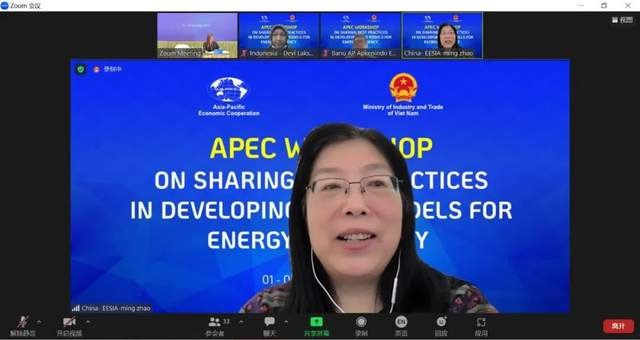

On December 1, 2022 Beijing time, the "APEC Energy Efficiency Seminar" officially began. This seminar is hosted by the Multilateral Trade Policy Department of the Ministry of Industry and Trade of Vietnam, and lasted for two days. The seminar is aiming to provide a platform for exchanges among economies, share practical experience and relevant information on energy efficiency of the ESCO model, explore the application methods and future development trends of ESCO in APEC economies, and help the APEC region achieve the established goal of reducing energy intensity as soon as possible.
Ms. Zhao Ming, director of EESIA and Co-Chairman of Asia Pacific Energy Efficiency Industry Alliance (APEIA), attended the seminar as a Chinese representative and delivered a speech on "Opportunities and Challenges for the Development of ESCO Model". She pointed out that in China, ESCO has entered a new stage of development in comprehensive energy services. The successful development of ESCO highly relies on three major factors: government guidance, market demand, and economic drive.
"The development of ESCO is at the right time," she said. With the continuous emergence of technological solutions in industries such as architecture, transportation, and public facilities (including regional heating and street lighting), as well as the comprehensive application of various business models such as integrated energy management, ESCO will continue to face further development. However, the development of ESCO inevitably also faces many challenges, such as financial support, improved service capabilities, and the opening up of public institution markets, which need to be improved.
She pointed out that green development and sustainable development are becoming a global consensus, and EESIA will promote cooperation and exchange between green and low-carbon industries, promote international cooperation in the field of green energy as the foundation, and contribute to promoting high-quality and sustainable development of China's green, low-carbon, circular, and carbon peak and carbon neutrality strategies.